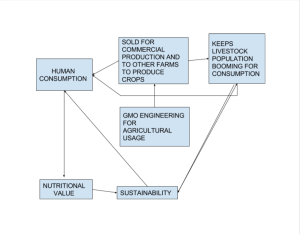An odd situation occurred last summer while I was working at a grocery store part time. It is a paradox when it comes to “healthy” food choices, as brands that have the healthy name are not exactly healthy. Today’s social world is all about whole foods and organic foods. Having worked at a grocery store during my first two years of college, last summer I witnessed people purchase the “organic” grapes that were five to six dollars more versus the regular grapes that were half the price, and were no different than the organic grapes. I said to them that they were the exact same thing but they insisted the “organic” grapes were better. I still scratch my head at that today. Today’s norm(s) when it comes to food, I feel, rely heavily on labels than what the actual healthiness of the food can deliver.
Some prominent societal issues today encompasses the anti-GMO movement. Genetically Modified Organisms (GMOs) are actually, contrary to popular belief, a way to preserve the food surplus. And, as long as the surplus remains greater than that of the human population, then the use of GMOs will continue until another source is found to sustain food. Think about it: A decade ago, you would not be purchasing exotic fruits year round, but only when they are in season. Grapes, as mentioned in my first paragraph, some of them that come to the stores are evidently huge compared to what they used to be. The quantity of fruit has increased exponentially, and the quality has become safe despite the use of pesticides and GMO. Without the use of GMO on crops, the human population would suffer detrimental consequences, perhaps to the point of widespread famine. I think we as a society take GMO engineering for granted because the norm(s) tell us think about it otherwise.


Hi Harrison,
I found your blog post very interesting and I strongly agree with it. Similar to my blog post, in ares where famine is wide-spread, GMO’s are needed for nutrition. I agree with the idea that if we can, we should when dealing with nutrition. Corn is on one the most artificially altered foods, and we use it everywhere in our daily lives. GMO’s are crucial in places like India,, because they are able to get the most nutrition out of a product without spending the money they would on “organic” products. I think GMO’s are a needed food product and their production should stay relevant.
You can read about my blog below.
http://geog030.dutton.psu.edu/2016/03/01/module-6-indias-beef-with-beef/
Hey Harrison. I liked your first paragraph about how people are willing to spend extra money on foods just for the label. I wonder if there really is much of a nutritional difference when it comes to organic vs regular? Perhaps the nutritional value isn’t much different, but the avoidance of chemicals and pesticides is what makes them healthier. As far as GMO’s go, I don’t see what the big deal is either. Ever since the beggining of agriculture, and perhaps even longer, we have been trying to manipulate our environment to give us the most food possible. I would even say that a cow is a genetically modified organism because I don’t think I’ve ever seen a wild cow running around. Anyways, feel free to check out my post!
http://sites.psu.edu/geog30/2016/02/28/module-6-jared-mummert/